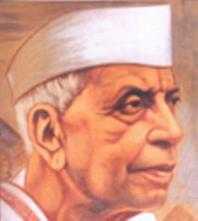Maithili Sharan Gupt
| Maithilisharan Gupt मैथिली शरण गुप्त | |
|---|---|
 | |
| Born |
Lala Madan Mohan Ju August 3, 1886 Chirgaon, Jhansi, Uttar Pradesh, British India |
| Died | December 12, 1964 (aged 78) |
| Occupation | Poet, Politician, Dramatist, Translator |
| Nationality | Indian |
| Education | [Primary Chirgaon], [Middle : Macdonal High School Jhansi] |
| Notable work(s) | Panchavati, Siddharaj, Saket, Yashodhara, vishvarajya etc. |
Maithilisharan Gupt (मैथिलीशरण गुप्त) (3 August 1886 – 12 December 1964) was one of the most important modern Hindi poets.[1][2] He is considered one among the pioneers of Khari Boli (plain dialect) poetry and wrote in Khari Boli dialect, at a time when most Hindi poets favoured the use of Braj Bhasha dialect.[3]
Early life
He was born in Chirgaon, Jhansi in a Gahoi family. His father was Seth Ramcharan Gupta and mother's name was Smt. Kashibai. He disliked school as a child, so his father arranged for his education at their home. As a child, Gupt studied Sanskrit, English and Bengali. Mahavir Prasad Dwivedi was his mentor. He was married in 1895.[4]
He was the teacher of Dewan Shatrughan Singh(Bundelkhandi Royal), who is known as Bundelkhand Kesri & Bundelkhand Gandhi.
Career
Literary works
Gupt entered the world of Hindi literature by writing poems in various magazines, including Saraswati.[citation needed] In 1910, his first major work, Rang mein Bhang was published by Indian Press. With Bharat Bharati, his nationalist poems became popular among Indians, who were struggling for independence. Most of his poems revolve around plots from Ramayana, Mahabharata, Buddhist stories and the lives of famous religious leaders.[citation needed] His famous work Saket revolves around Urmila, wife of Lakshmana, from Ramayana, while another of his works Yashodhara revolves around Yashodhara, the wife of Gautama Buddha.[citation needed]
प्राण न पागल हो तुम यों, पृथ्वी पर वह प्रेम कहाँ..
मोहमयी छलना भर है, भटको न अहो अब और यहाँ..
ऊपर को निरखो अब तो बस मिलता है चिरमेल वहाँ..
Translations
Gupt also translated major works from other language into Hindi. These include the Rubaiyat of Omar Khayyám and Swapnavaasavdatta, a Sanskrit play.[citation needed]
Public office
After India became independent in 1947, he was also made an honorary member of the Rajya Sabha, where he used poetry to put his opinions before the other members. He remained a member of the Rajya Sabha till his death in 1965.[citation needed]
Creative style
His works are based along patriotic themes, among others poets such as Ramdhari Singh Dinkar, Makhanlal Chaturvedi. His poetry is characterized by non-rhyming couplets, in Khadi Boli. Although the couplet structure is non rhyming, the prominent use of alliterations lends a rhythmic backdrop due the rhythmic alterations between vowels and consonants. He was a religious man, and this can be seen in his works.
Major works
Poetry:
- Rang mein Bhang
- Bharat-Bharati
- Jayadrath Vadh
- Vikat Bhat
- Plassey ka Yuddha
- Gurukul
- Kisan
- Panchavati
- Siddharaj
- Saket
- Yashodhara
- Arjan Aur Visarjan
- Kaaba-Karbala
- Jayabharat
- Dwapar
- Jahush
- Vaitalik
- Kunal
- Vishvarajya
- kirano ka khel
- "manushyta"
Drama:
- Tilottama (1916)
- Chandrahaas (1916)
- Anagh (1925)
- Vijay Parwa (1960)
References
- ↑ http://www.screenindia.com/old/fullstory.php?content_id=7328
- ↑ http://articles.timesofindia.indiatimes.com/2009-08-04/nagpur/28157631_1_premchand-hindi-literature-anthropologists
- ↑ Rupert Snell; Ian Raeside (1998). Classics of Modern South Asian Literature. Otto Harrassowitz Verlag. pp. 240–. ISBN 978-3-447-04058-7. Retrieved 26 June 2012.
- ↑ "Biography of Maithili Sharan Gupt". Poem Hunter. Retrieved 12 December 2013.
- 301 Shreshtha Hindi Nibandha by Shree Sharan and Rastogi.
External links
- Maithili Sharan Gupt at Kavita Kosh
- Three poems of the poet from Bharat Bharati are available for readers at www.geeta-kavita.com
| |||||||
